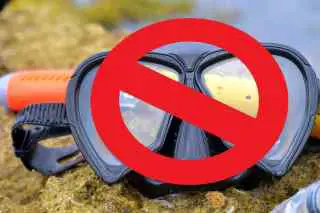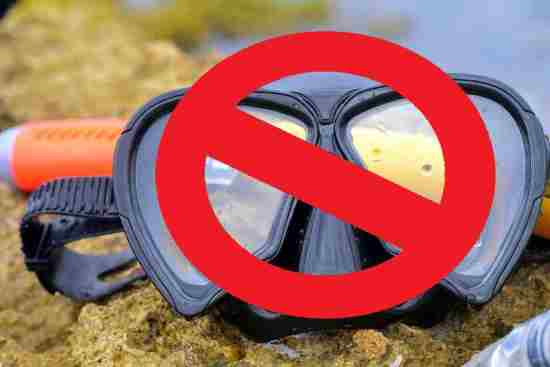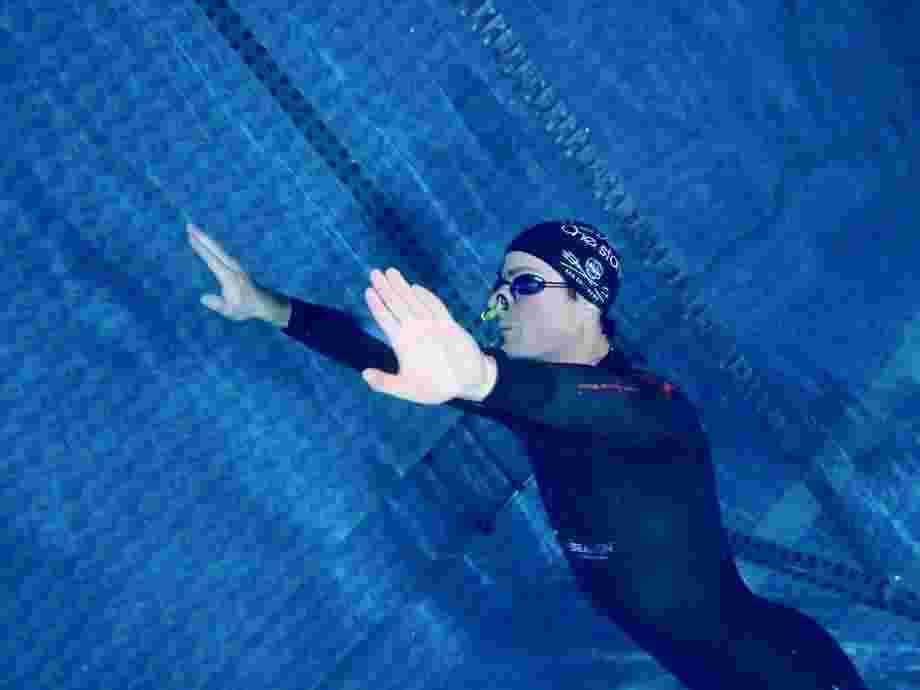- You are here:
- Home »
- Blog »
- Gear Guide »
- Freediving without a mask – is it possible?
Freediving without a mask – is it possible?


Can you go freediving without a mask? Find out below!
Are you sick of wearing a mask when freediving?
Do you get tired of constantly having to waste breath equalizing your mask during descents?
Frustrated with the drag and resistance that comes from wearing a big clunky mask underwater?
If so, you’re probably wondering if it’s possible to go freediving without a mask.
The answer here is yes, you can go freediving without a mask. Despite this, most people choose to wear a mask anyway, because it’s much safer. Freediving without a mask massively reduces underwater visibility and adds a whole lot of risk to an already risky sport.
My advice to you – if you haven’t done so already – is to invest in a high-quality freediving mask (NOT a scuba mask!).
Freediving masks typically have low air volume, so require much less oxygen to equalize at depth, leading to deeper freedives.
Freediving masks are also tailored for a more comfortable fit than scuba masks, and have a much lighter, sleeker build (making you faster and more agile in the water).
I recommend investing in the Aqua Sphera X Freediving Mask – click here to view it on Amazon.
Anyway – back to our discussion on whether you can go freediving without a mask.
There are many advantages and disadvantages to freediving without a mask. Let’s explore them below, starting with the advantages.
Freediving without a mask: the pros
The idea of freediving without a mask attracts many freedivers because it comes with a lot of perky benefits.
Such benefits include:
- Saving air: If you’re not wearing a mask, you don’t have to be constantly equalizing it as you descend in order to fight off mask squeeze. And if you don’t have to equalize your mask, you’ll end up saving more air in your lungs. This is especially useful for advanced freedivers who need every ounce of air available in their lungs to equalize their ears at depth.
- You don’t have to spend money on a freediving mask: Freediving masks are specifically designed to be smoother, smaller and with lower volume than normal scuba masks. This means they also tend to be quite rare and even sometimes expensive to order. Skipping the mask can do great things for your bank account!
- Wearing a mask can be uncomfortable: Mask squeeze, extra resistance when swimming and annoying straps dangling around your face all contribute to a less comfortable diving experience with masks.
- Less drag when you dive: Freediving masks are engineered to be sleeker than normal scuba or snorkelling masks. Despite this, you still have to fin a little harder to counteract the resistance your mask puts up in water – especially if you’re caught in a strong current.
- More diving reflex: For some divers; wearing a mask can slow down or reduce your mammalian dive reflex. This leads to more oxygen consumption and shallower dives.
- Less distractions: Diving without a mask means you’ll have to close your eyes the entire time you’re underwater. Although this can be dangerous in rare occasions, the upside of this is you’ll save more mental energy. You won’t be looking around and thinking about things in your environment. Instead, you can simply shut your eyes, clear your mind and get in the zone.
- More relaxation: Some divers report feeling more relaxed and ‘natural’ when freediving without a mask. The flip side of this is that others report feeling more anxious not being able to see properly!
- Easier to perform Surface Protocol: When resurfacing from a dive, you have 15 seconds to perform the Surface Protocol. If you’re not wearing a mask or goggles, this is much easier. If you are wearing a mask, it can be an annoying distraction to have to signal you’re okay once you’ve resurfaced, and gasping for air.
Freediving without a mask: the cons
Although there are many benefits to freediving without a mask; these do not come without risks and drawbacks.
Below I’ve listed the negatives of freediving without a mask:
- Poor visibility: It can be very difficult to recover tags if the visibility conditions underwater are poor. The last thing you want to do is fumble around in the dark trying to find a tag at your target depth while losing valuable oxygen.
- Not as safe: In the case of an emergency, getting lost underwater or getting tangled in a rope; you need to be able to see properly. Without goggles or a mask, your visibility is massively reduced so your chances of getting out of any unsafe situations drops.
- Eye irritation: If you dive without a mask, but still open your eyes while in salty ocean water or chlorinated pools…you’ll find the salt/chlorine will sting your eyes and make them go red, sore and detract from your overall freediving experience. If you’re going to open your eyes while freediving…make sure you have a mask on to protect them. Or make sure you’re diving in low salt/chlorine water.
- Less relaxing: As stated above, freediving without a mask means you’ll need to close your eyes the entire time underwater. Some freedivers say this can actually add to their anxiety and cause them to worry as they’re unable to see what’s in their environment. And this is a very valid concern – diving with your eyes closed means you can’t see dangerous animals or whether you’re about to become trapped in something. There’s not much point ditching your mask if all it’s going to do is boost your anxiety and cause you to chew through your oxygen reserves.
- Not suitable for cold water: Freediving in cold water without a mask or goggles may let you hit deeper dives…but it can also be incredibly uncomfortable. There’s nothing worse than having to cut a dive short all because your face is stinging! If you are diving in cold water, do yourself a favor and grab a freediving hood, and some nice, thick neoprene gloves to keep you warm if you haven’t done so already – you’ll thank me later!

Taking a dip in cold water? You might want to think twice before ditching the mask!
- Water will run into your nose: Some divers claim descending without a mask triggers an involuntary reflex where they snort water up their nose. This can quite painful especially if it’s salt water. If you think this might apply to you, try testing freediving without a mask first, before ditching it or invest in a freediving nose clip to keep the water out.
Masks when freediving: the final verdict
There are many pros and cons to using a mask when freediving.
It should go without saying the choice is really up to you and what feels most comfortable and most safe.
However, if you really want a general guideline, I believe the following people should use a mask when freediving:
- Beginner freedivers should use a mask: As a beginner, you’re still mastering the freediving learning curve. You likely don’t have much experience; so safety is your number one priority.
-
-
- As a beginner, you will probably feel a little anxious when first experiencing
-
-
-
- , the effects of pressure at depth and any real intimate up-close interaction with marine life. Reduced visibility from not wearing a mask will only cause you to worry more. For that reason beginners should stick to
-
- Recreational freedivers should use a mask: If you’re diving recreationally (eg: for fun, to see marine life and to not hit record depths); you should wear a mask. When diving just for fun, it’s always great to explore caverns, caves and to watch all the different fish darting around. This means you’ll need a mask or goggles (unless your eyes are particularly resistant against salt water irritation).
- Spearfishers should wear masks: For spearos; visibility is everything. For practical and safety reasons you should really be wearing a mask when spearfishing. Not only will you be better able to see the fish you shoot, but also, you won’t accidently hit another diver!
- Cold water freedivers should wear masks: Diving in low temperature waters without a mask will either sting your face throughout the entire dive (especially during your first descent)…or make your face go completely numb. Neither are comfortable experiences – freediving should be relaxing! Make sure you wear a mask and stay warm in cold waters.
All of the above options are good examples of when you probably do need a mask when freediving. As stated at the top of this post, I still recommend investing in this Aqua Sphera X freediving mask here – it’s still the best on the market.
But what about the times when you don’t need a mask for freediving?
If you’re any of the below, you can likely ditch the mask/goggles when freediving:
- You’re an advanced freediver: If you’ve been freediving for years, you’ve probably seen it all. You’re likely very comfortable during almost any part of the dive and have pretty damn strong control over your own mind and emotions. In that case, feel free to ditch the mask and goggles and enjoy all the benefits of ‘naked diving’ so as to speak.
- You’re diving very deep to break records: If you’re diving competitively; you need to get every advantage you can. Not diving with a mask can give you that extra edge to come out on top of your opponents. Not only will you have less resistance and less drag leading to faster speeds… you also won’t waste any air equalizing your mask. If you’re a competitive diver: feel free to lose the mask. Also, make sure you’ve invested in high-quality bi-fins or monofins to hit that break-through level of underwater speed.
How to freedive without a mask
Freediving without a mask is pretty much the same as diving with a mask. The only differences are that you don’t have to equalize your mask, so you can potentially dive deeper.
You’ll also want to keep your eyes closed the entire time – unless you’re either diving in water with low amount of salt or have eyes which are fairly resistant to salt.
Also – if it’s your first time – be prepared for the uncomfortable feeling of water going up your nose during vertical descents.
Freediving mask vs goggles: whats the difference?
The main difference between a freediving mask and freediving goggles, is that freediving goggles don’t need to be equalized under pressure.
There are two main types of freediving goggles in the market, and both work differently.
-
- The first type are Hektometer goggles. The creators of the Hectometer goggles have perfectly explained the concept behind their product on their website. I’ve quoted it below:
The principle is quite simple: as you descend the silicone membrane placed on the inside of the frame will move towards your eyes, decreasing the volume of the airspace within the goggles. Simultaneously, water will flow through a small hole into the space between the frame and the membrane. On return to the surface the mechanism inverts and the water will flow out again.

Goggles are often a popular substitute for freediving with a mask.
- The second type of freediving goggles on the market are fluid goggles. In fluid goggles, the area between your eyes and the lenses is filled with salt water. This means you don’t have to equalize the goggles. The lenses are designed in a convex shape, so the light refracts nicely through the goggles so you have good vision.
Both styles of goggles are different in design. Despite this, they still carry the same end benefit: to remove the need for mask equalization when freediving.
And no mask equalization means deeper, longer dives with less effort.
Other benefits which freediving goggles have over masks include:
More focused & relaxed while swimming faster & deeper: most freedivers who use goggles tend to also wear nose clips. The reason for this is because it allows for hands-free equalization…you can simply use the mouth-fill equalization technique while keeping your hands above your head when descending. This makes for a more hydrodynamic swimming posture as well as a calmer, more focused diving experience.
Goggles tend to be smoother and lighter than masks. This means slightly less drag and more comfortable fits.
About the Author Gerrie van Niekerk - Apnealogy
Gerrie is a passionate Freediver, Spearfisher, Digital Marketer, and author for the Apnealogy website. Gerrie is an SSI Level 1 certified Freediver who loves geeking out about freediving and spearfishing gear and lives for his family and adventure.


